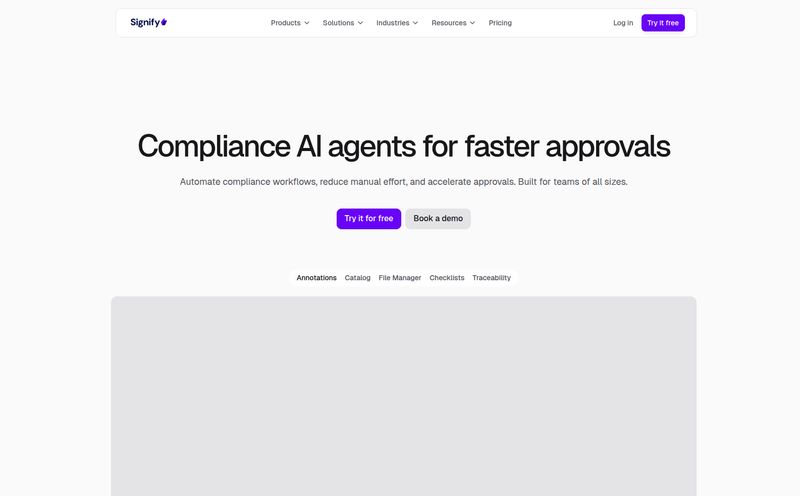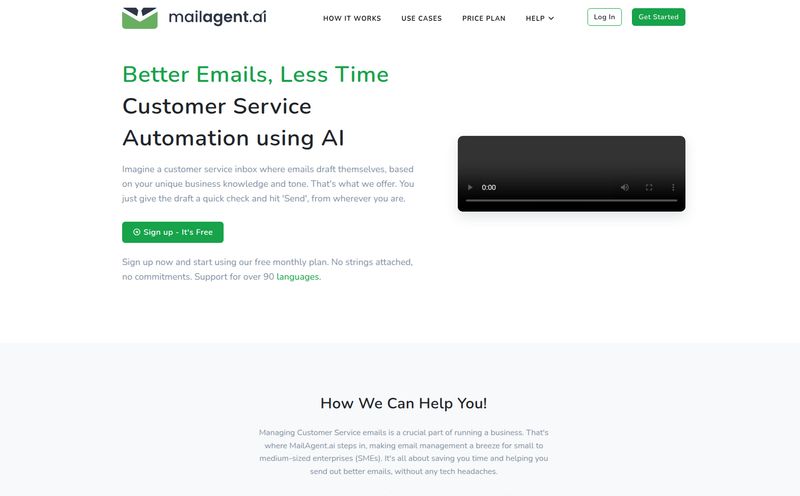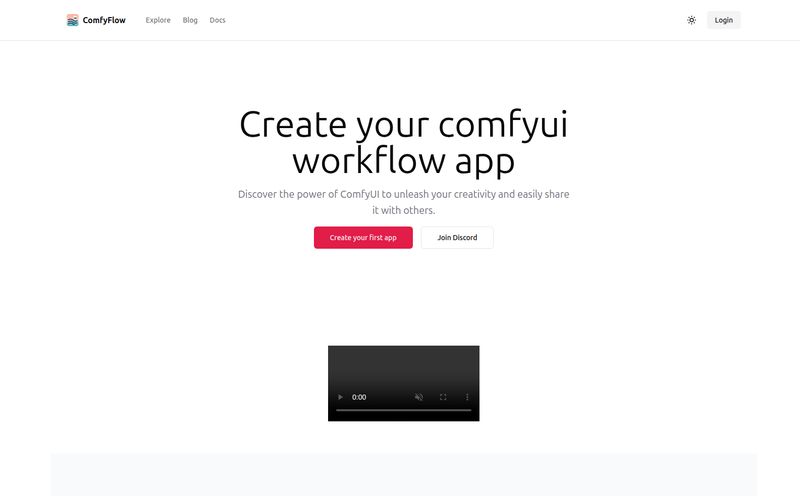If you're anything like me, your daily to-do list looks less like a list and more like a desperate plea to a higher power. There are the big, chunky strategy projects. The endless research tasks. The tiny, annoying administrative things that somehow eat up three hours. My digital life, much like my browser, constantly has too many tabs open. For years, the solution has been a patchwork of different freelancers, VAs, and a whole lot of caffeine.
It’s a grind. Finding the right person on Upwork can feel like online dating. You spend hours swiping through profiles, go on a few “interview” dates, and hope you don’t get ghosted after the first project. So when I heard about a platform called Scout AI, my curiosity was definitely piqued. The promise? To be a sort of universal remote for getting stuff done. A single place to offload tasks, big and small, without the usual headache. But does it live up to the hype? I decided to take a closer look.
What Exactly is Scout AI? (And Why Should You Care?)
At its core, Scout AI is a task marketplace. Simple. But the magic, or at least the potential magic, is in how it decides who—or what—does your bidding. Instead of you scrolling through endless lists of freelancers, you just submit your task. Scout AI then acts like a super-smart project manager, analyzing your request and matching it with the best possible resource. And that resource could be one of two things: an AI agent or a vetted human professional.

Visit Scout AI
Think of it like a digital concierge for your workload. You don't need to know who can best format that spreadsheet or which AI model is best for summarizing a 50-page report. You just need to know what you want done. The platform is designed to handle the 'how.' This is a pretty big shift from the traditional freelance model, where the burden of choice is entirely on you.
The Hybrid Approach: AI Agents Meet Human Experts
This is the part that really got my attention. The world is going nuts for AI right now, but we all know its limitations. It can’t (yet) replicate true human creativity or strategic insight. Scout AI seems to understand this, building its entire model around a hybrid approach. It's not just another AI wrapper; it's a system that tries to use the right tool for the job.
When AI Takes the Wheel
For certain tasks, AI is a no-brainer. Think about things like:
- Transcribing audio from a client call.
- Pulling specific data points from a long list of websites.
- Summarizing a competitor's blog posts from the last quarter.
- Basic image resizing or formatting.
These are repetitive, data-driven tasks where AI excels. By routing these to an AI agent, you should theoretically get a fast and cost-effective result without bothering a human expert who’d probably be bored to tears anyway.
Calling in the Human Cavalry
But what about the stuff that requires a real brain? You're not going to ask a bot to ghostwrite a personal essay for your company's blog or develop a nuanced go-to-market strategy. That’s where the human experts come in. For complex, creative, or strategic tasks, Scout AI routes your project to a real person. This blend is what makes the concept so appealing. It acknowledges that for all the talk about automation, some jobs just need a human touch, a bit of experience, and a dash of intuition.
The Good, The Bad, and The... Vague
Alright, no tool is perfect. After digging into what Scout AI offers, a few things stand out—for better and for worse. Let’s break it down, conversationally.
The Good Stuff (The Real Wins)
The biggest win here is the potential for mental offloading. Seriously. The time and energy I've spent just managing freelancers is a job in itself. The idea of submitting a task and trusting a system to handle the delegation and quality control is incredibly appealing. That built-in 'automatic quality control' feature is a huge point in its favor. It's a direct response to the Wild West nature of some platforms, where a five-star rating can sometimes mean very little. Having a baked-in QC layer could save a ton of back-and-forth.
I also love the scalability. The fact that I can delegate a tiny 15-minute research task or a 20-hour project through the same interface is a game changer. It simplifies the tech stack and the mental workflow.
The Not-So-Good (The Reality Check)
Now, for the dose of skepticism. The first thing I noticed is that tasks can take up to 72 hours to complete. In the world of SEO and digital marketing, that can be an eternity. This isn't the platform for your, 'I need a press release drafted about this breaking news five minutes ago!' tasks. It requires planning and a bit of a buffer, which might not work for every team or every project.
My other major hang-up is the lack of transparency around the vetting process for the human experts. The platform promises 'vetted professionals,' but what does that actually mean? Who are they? What’s their background? How are they chosen? The quality of any service marketplace is only as good as its talent pool. Without more insight into how they vet their pros, you're placing a lot of faith in their black-box algorithm. This is probably my biggest concern.
Let's Talk Money: The Scout AI Pricing Mystery
Here's the million-dollar question: what does it cost? Well, that's a bit of a mystery. As of now, there’s no public pricing page or clear cost structure. This is pretty common for platforms in their early stages. They might be testing different models—pay-per-task, a credit system, or a monthly subscription. Who knows.
While understandable from a business perspective, it's a bit of a hurdle for potential users. I want to know if I'm paying a premium for the convenience or if it’s competitive with hiring freelancers directly. Until the pricing is clearer, it's hard to fully evaluate the value proposition. I’ll be keeping an eye out for updates on this front.
Who Is This Really For? Finding the Ideal User
So, who should be clicking refresh on the Scout AI homepage? I see a few key profiles that could really benefit:
- The Solopreneur or Founder: Juggling everything from product development to marketing. Being able to offload market research, content creation, and admin tasks to a single source could be a lifesaver.
- The Small Agency Owner: Constantly dealing with fluctuating client needs. Scout AI could act as a flexible talent pool, allowing them to scale support up or down without hiring full-time staff.
- The Overwhelmed Marketing Manager: Tasked with content, SEO, social media, and reporting. Using Scout to handle the more formulaic parts of the job (like creating content briefs or pulling analytics reports) could free them up for high-level strategy.
It’s probably not for someone who needs instant turnarounds or works with highly sensitive, proprietary data where they need to personally vet every single person who touches it.
My Final Take: Is Scout AI Worth a Shot?
I'm cautiously optimistic. The concept behind Scout AI is brilliant. It addresses a real pain point that almost every professional feels: the fragmentation and friction of delegation. Blending AI and human intelligence isn’t just a gimmick; it’s a genuinely smart way to approach the modern workload.
However, the platform's success will hinge on execution. They need to be transparent about their vetting process, clarify their pricing, and manage expectations around turnaround times. If they can nail those things, Scout AI could easily become an indispensable tool in my productivity arsenal. For now, it's a fascinating platform to watch. It might just be a glimpse into the future of how we work.
Frequently Asked Questions
- 1. What kind of tasks can I delegate to Scout AI?
- You can delegate a wide range of tasks, from small, automated jobs like data entry or transcription (handled by AI) to large, complex projects like strategic research or content writing (handled by human experts).
- 2. How does Scout AI ensure the quality of the work?
- Scout AI has a built-in 'automatic quality control' system. While details are sparse, this suggests a review process is in place to ensure the final output meets the requirements of your task before it's delivered to you.
- 3. Is Scout AI a good choice for urgent tasks?
- Not really. The platform states that task completion can take up to 72 hours. It's best suited for tasks where you have some lead time and can plan ahead, rather than last-minute emergencies.
- 4. Can I choose whether my task goes to an AI or a human?
- No, the platform's core feature is its matching algorithm. You submit the task, and Scout AI's system decides whether an AI agent or a human expert is the best fit for the job. You're delegating the task and the decision.
- 5. How much does Scout AI cost?
- Currently, Scout AI has not made its pricing public. The cost structure could be a pay-per-task model, a subscription, or a credit-based system, but this information is not yet available.
Conclusion
The world of work is changing fast, and tools like Scout AI are right at the forefront of that shift. It’s an ambitious attempt to solve the age-old problem of having too much to do and not enough time. By cleverly combining the raw power of AI with the nuanced skill of human professionals, it offers a compelling vision for the future of productivity. It has some kinks to iron out, for sure, particularly around transparency and speed. But the core idea? It's one of the most interesting I've seen in a long time. I, for one, will be watching closely.
Reference and Sources
- For more on the platform itself, you can visit the official website (I'm assuming it's at scoutai.com).
- To understand the broader context of the gig economy and freelance platforms, Harvard Business Review has some excellent articles on the challenges and opportunities.
- For a primer on how AI is being integrated into productivity workflows, check out recent coverage from publications like TechCrunch.


